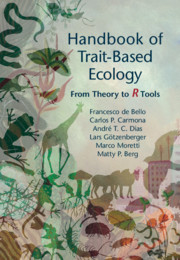Book contents
- Handbook of Trait-Based Ecology
- Handbook of Trait-Based Ecology
- Copyright page
- Epigraph
- Contents
- Preface
- 1 General Introduction
- 2 Trait Selection and Standardization
- 3 The Ecology of Differences
- 4 Response Traits and the Filtering Metaphor
- 5 Community Metrics
- 6 Intraspecific Trait Variability
- 7 Community Assembly Rules
- 8 Traits and Phylogenies
- 9 Effects of Traits on Ecosystem Processes and Services
- 10 Response and Effect Traits across Trophic Levels
- 11 Trait Sampling Strategies
- 12 Applied Trait-Based Ecology
- References
- Index
12 - Applied Trait-Based Ecology
Published online by Cambridge University Press: 08 March 2021
- Handbook of Trait-Based Ecology
- Handbook of Trait-Based Ecology
- Copyright page
- Epigraph
- Contents
- Preface
- 1 General Introduction
- 2 Trait Selection and Standardization
- 3 The Ecology of Differences
- 4 Response Traits and the Filtering Metaphor
- 5 Community Metrics
- 6 Intraspecific Trait Variability
- 7 Community Assembly Rules
- 8 Traits and Phylogenies
- 9 Effects of Traits on Ecosystem Processes and Services
- 10 Response and Effect Traits across Trophic Levels
- 11 Trait Sampling Strategies
- 12 Applied Trait-Based Ecology
- References
- Index
Summary
Chapter 12 provides some key examples of how to use trait-based methods as a tool for biodiversity monitoring, one that often shows more sensitivity to environmental changes as compared to taxonomic-based metrics. The examples show how trait-based approaches can help to broaden the scope of applied environmental sciences, using ecological theory to solve different types of environmental issues of concern. Focusing on response and effect traits, a discussion is provided on how it is possible to restore or create new ecological communities that are more resilient to environmental changes, or that enhance desirable ecosystem services. Finally, it is argued that poor literacy in functional ecology might act as a barrier to communicating with decision makers, and incorporating trait-based approaches in environmental policies.
Keywords
Information
- Type
- Chapter
- Information
- Handbook of Trait-Based EcologyFrom Theory to R Tools, pp. 231 - 249Publisher: Cambridge University PressPrint publication year: 2021
Accessibility standard: Unknown
Why this information is here
This section outlines the accessibility features of this content - including support for screen readers, full keyboard navigation and high-contrast display options. This may not be relevant for you.Accessibility Information
- 1
- Cited by
